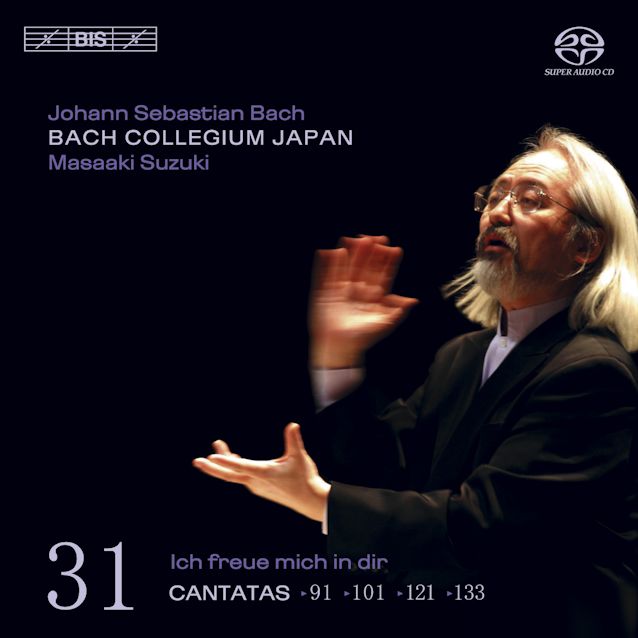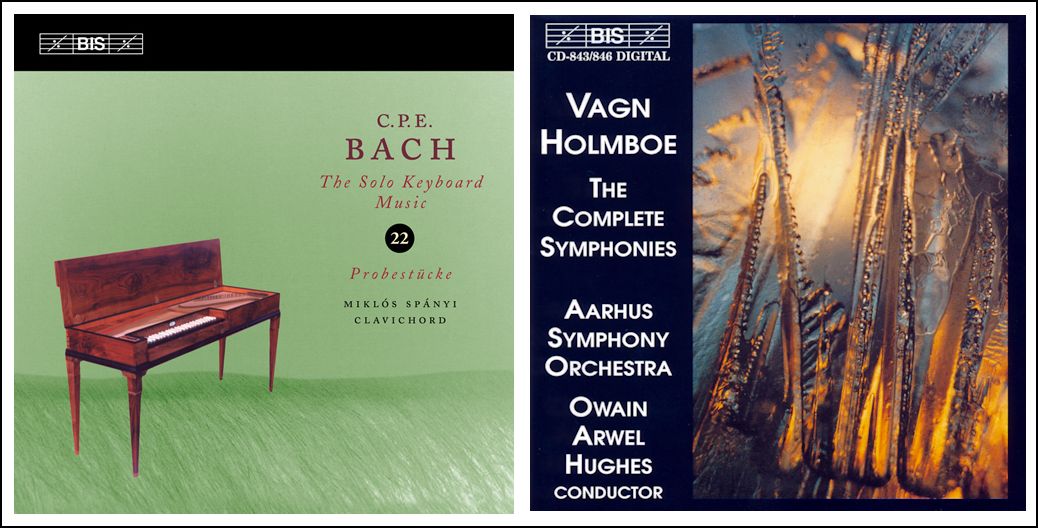Record Producer Robert
von Bahr
A Conversation with Bruce Duffie
Robert von Bahr (born August 27, 1943). Swedish music producer
and record company director.
Robert von Bahr trained as a music teacher and singing teacher at the
Royal College of Music in Stockholm and also studied law at Stockholm University.
He worked as a music technician for the Stockholms Filharmoniska Orkester
(now Kungliga Filharmonikerna) from 1968 to 1973, and as a gramophone producer
since 1970. He founded the record company BIS in 1973, of which he is CEO.
He is also founder and CEO of the music download service eClassical AB.
He is the son of civil engineer Lars von Bahr and Finnish ballet dancer
Margaretha von Bahr née Wasenius (grand-daughter of Finnish music
critic Karl Fredrik Wasenius). He is the half-brother of the Finnish pop
singer Riki Sorsa.
Bahr received the UK magazine Gramophone's Special Achievement Award
in 2020.
|
Robert von Bahr was in Chicago early in November of 1998, and spent a few
minutes with me discussing his interesting and varied career. Portions
were used on WNIB, Classical 97 in Chicago two months later, and now, as
he is about to celebrate his 80th birthday, I am pleased to present our entire
conversation.
Bruce Duffie: You are both founder and principal
producer of BIS Records?
Robert von Bahr: I am the founder and the owner,
but not the principal producer any more. I stopped producing last
year after 600 CDs.

BD: Why?
Bahr: Because the organizational matters take so much
of my time, and I have to make so many travels to all parts of the world.
There simply wasn’t any possibility for me to continue recording. But
I really do miss it. Even some of my artists say that they miss it,
but I think they are only trying to be nice to me. [Both laugh]
BD: How did you get involved in classical music?
Were you a fan of it from early childhood?
Bahr: I was forced to play the piano when I was six, and
continued to do that to thirteen when I rebelled, and started playing
competition bridge instead. Then I took it up again as a singer when
I was eighteen, and got really involved by the age of thirty, because I
started BIS. That’s a very good way to get involved in classical
music. Starting a recording company really gets you involved.
BD: But why did you record classical music instead
of something perhaps more lucrative?
Bahr: Good question actually! I’m not sure that
everything else is more lucrative, only when you get the hits. But
this is not the main thing anyway. My expertise, if I have anything
of that, is in classical music, and I want to continue. That is where
my interests lie, and I can’t do anything else.
BD: At least what you do, you do very well!
Bahr: At least I belong to the group of very few fortunate
people that can make a living out of pursuing his passion. Not so
many people can say that.
BD: Many people would want to know what goes into
producing a record. They see the name of the producer, and wonder what
that person has done.
Bahr: I can only speak for myself, but what has gone into
that is an awful lot. First of all, there is a lifetime of experience,
but then everybody else would say that. We do it differently, though.
When an artist comes to Sweden to record for us, first of all I make sure
that the artist knows us very well, and the way to do that is for the artist
to actually stay with my family. They stay in my house, and work and
live with my family, together with screaming kids and all that we have.
We all go into the sauna, and really share the family life for a while.
That means that we are actually getting to know each other on another
level, rather than just a purely professional level, and that pays dividends
when you get to the recording site.
BD: Does that make them better artists, or just simply
better people?
Bahr: It is neither, nor. It doesn’t make them better
people. It would be too cocky to say that. It doesn’t make
them better artists because they know their business. It makes the
relationship between producer and artist during the recording very much
better, and that relationship is very important for the result of the recording.
* * *
* *
BD: As producer, will you have set up a lot of things
before the artist arrives?
Bahr: No, not even that. We arrive together.
Actually, the artist sometimes helps carry in the equipment.
BD: But you’ve already made the decision to record
this artist?
Bahr: Oh, yes! [Laughs] We don’t just invite
any Tom, Dick or Harry to come and live with us, and do a record!
BD: [With a gentle nudge] Maybe that’s the
next great trio!
Bahr: Well, it could be! [Both laugh] Of course,
we have made the decision, and that decision is something we don’t arrive
at lightly. As a matter of fact, that’s the main hurdle to jump over.
But once we have made the decision, we go all out in trying to carry out
the wishes of the artist, and the wishes of the composer. We go all
the way to make sure that the record is really going to be good.
One of the things is that we never go into studios. Rather, we search
high and low for a hall, or a locality which is suitable, and suited to
the music in question. That is half the battle. Once you find
a hall somewhere where you can record, where the music sounds fantastic by
itself, without adding anything or detracting anything, then you have won
it. You don’t have to screw around with microphones too much because
the sound is good from the beginning. You get the sound, but before
all of that, there is the artist. If they feel comfortable about where
they are standing, or sitting and performing, and if they feel comfortable
with the ambiance of the hall, and with the ambiance between the producer
and themselves, they will produce much better music.
BD: Once the sound is right in the hall, then it’s
your job to capture that right sound?
Bahr: Yes!
BD: Are you always able to do so?
Bahr: Almost always, yes. I will be as cocky as
that.

BD: I always ask performers how they select
which repertoire they’re going to perform. As the producer and the
owner of the label, how do you decide which pieces you’re going to record?
Bahr: BIS has quite specific wishes on that point.
First of all, we have a lot of big huge cycles going on where we want to
record every note the composer ever wrote. Names include Sibelius
[CD shown above], Vagn Holmboe the Danish composer (1909-1996) [CD
shown below], and Kalevi Aho (1949 - ) [CD shown farther below]
and Einojuhani Rautavaara
(1928-2016), both Finnish composers. [See my interview with Rautavaara.]
We also have J.S. Bach, father and son, the son in this case being
C.P.E. Bach, and a lot of other cycles where we are doing everything. That
takes care of a big part of our capacity. Other than that, we usually
to try to go for unknown works that have not been performed or recorded
before, but is great music. Or, in the case of music which has been
recorded before, exceptional performances of some kind.
BD: I would assume if it’s been recorded before,
it hasn’t been over-recorded?
Bahr: We even have that sometimes. For instance,
we are doing all the Bach Cantatas with a Japanese baroque orchestra.
The point there being that everybody thinks the Japanese can only copy,
and that they have a fantastic technique but no soul. In this case
it is not true. We have a fantastic orchestra, the Bach Collegium
Japan [CD shown at right], and they can really do justice to these
pieces better than anybody else on this planet right now. I would
like to think that music is the only language which can immediately appeal
to anybody in this world, without any cultural barriers and without knowing
the language. Without knowing anything, you can still communicate
somehow through music. Therefore I very much like to mix cultures.
For example, Swedish people doing American music, or Germans doing
Argentinian or Portuguese music, or Japanese doing German music, and so
on.
BD: Is your ultimate goal to find some record that
sells six billion copies?
Bahr: No! The selling part of it is important, but
it’s not my first goal. The selling figures come last on the wish
list. They really do. The main object for us is to make sure
that whatever approach we have for the time-being, we are really doing the
utmost with that artist and that location. We make sure that nothing
can be done better than that. That is our ultimate goal. Now,
if the general public likes it, they will buy, and thereby we can make a
living. Fine, but that consideration comes last. We do primarily
what we like to do, and if the general public likes it, fine. If they
don’t like it, well, too bad!
BD: But obviously you must guess right much of the
time.
Bahr: [Thinks a moment] I would say that we have
a bit of a feeling for that, but even with my experience of twenty-five years
at BIS, it is impossible to guess right every time, or even the majority
of the time. We have had big failures, like our epoch-making C.P.E.
Bach cycle of all his music. We have eight volumes of his keyboard
concertos, almost all of them being world premiere recordings, and all of
them being fantastic music, wonderfully performed [CD shown below].
The critics just love it, but the general public does not. So,
we are not going home on that. On the other hand, we have a Japanese
counter tenor singing Japanese songs in Japanese, which has sold more than
50,000 world-wide. I don’t mean only in Japan. We have sold five
or six thousand in the United States alone, because this little guy can communicate
to people. They instinctively understand what it’s all about, even
though they don’t understand a word of it.
BD: They just hear the sound?
Bahr: The sound and the expression, and that message gets
across cultural barriers somehow. He can transform.
BD: For the records that don’t sell, do you keep
them in the catalogue hoping they might eventually sell?
Bahr: We have never ever deleted any record in our twenty-five-year
existence. Doing close to a thousand CDs, every note we ever recorded
is in stock on the shelves to be sold to whoever likes it. We don’t
delete. Full-stop.
BD: The LPs have been re-issued on CD, and now they’re
available again?

Bahr: That’s correct, though not on a one-to-one basis.
We have recompiled them.
BD: That makes better use of the CD?
Bahr: Yes. The LPs were too short, and we had a
lot of mixed programming. So we tried to streamline the programming
so that it fits better together on the CDs.
BD: Are you happy with the technology that is being
used today?
Bahr: Yes, basically I am, because I don’t really believe
in technology as such. We have gotten to the stage now where you cannot
really improve the sound very much more. We have tested 24-bit recordings
against 16-bit recordings, from exactly the same sound source, recorded
differently. We are very, very, very hard put to hear a difference,
even though we can listen A to B, and hear the same thing immediately one
after the other. We can hardly distinguish them. The main thing
is, and where you really can gain all of it, is if you use the right location.
That makes a huge difference from a good recording to an indifferent recording,
or even a bad recording.
BD: You just want great sound of great music?
Bahr: Yes, and you get that through completely different
means. That is not to say that we don’t record 24-bit, but it doesn’t
mean a thing. What does mean a thing is where and how we record it.

BD: Do you only record great music?
Bahr: No, but we try to.
BD: What is it that makes a piece of music great?
Bahr: You cannot answer that in a generalized way.
It’s individual.
BD: Then what does it mean for you?
Bahr: I only know that when something really hits me, and
grabs my heart and shoves it around, that is when a piece of music is great
for me. That same piece of music may be completely unimportant to
some other person, and vice versa. Something that leaves me completely
cold may strike another person as wonderful. It is a matter of what
you like and what you don’t like. If you are calm during a fantastic
performance of something, or if you just hear it while you are at dinner,
in that case I don’t think you are really listening to it. I’ve even
had professional reviewers who have said that they have actually reviewed
a record while standing in the shower! [Both laugh] Now, come
on!
BD: [Philosophically] Maybe your record got
them cleanest! [Both continue laughing] I usually ask this question
of performing musicians, so let me ask it of the professional technological
musician. What is the purpose of music?
Bahr: To evoke feelings, and transmit feelings.
If a piece of music is good, especially if the performer is good, they
can evoke feelings without the hindrance of a cultural barrier. A
case in point is Yoshikazu Mera [CD shown at right], the counter
tenor I was talking about earlier. When I first heard him sing, it
was at a party in the middle of the night. He stood up on a chair,
and sang. I had absolutely no clue what he was singing about, because
at that time I didn’t know Japanese too well. Even so, I was completely
sober because I don’t drink alcohol, and tears starting running down my cheeks.
Somehow, in spite of the language problem, he transmitted a feeling
and a condition to me that instinctively made me understand that this was
something completely tragic, which it was. I don’t know how he did
it. Some people are born with the ability to make music. When
you can be touched to a certain degree, even if it’s negative touch, the
more the better. You may hate something, and that’s okay. I
just think that you shouldn’t be indifferent. If you listen to something
and you’re indifferent, then it wasn’t worth it.
BD: The performer must evoke feelings of some kind?
Bahr: Yes, I strongly believe that.
BD: Besides making records, do you also go to live
concerts?
Bahr: Yes, I do, and that is in spite of my profession!
[Laughs] I am able to wear different hats. Music should
be enjoyed at live concerts, however that isn’t the ideal world. You
can’t. There’s no way that everybody can enjoy all kinds of music
anywhere in the world, so a well-produced recording is the next best thing.
But if you do have an alternative, go to the concert.
BD: I’m the same way. If I’m giving a lecture,
I have a record with me, and I will say, “This is
plastic. The concert is the real thing.”
Bahr: Yes, agreed. The plastic can be made better
or worse, but I completely agree with you.
* * *
* *
BD: Did you enjoy producing records?
Bahr: Yes. It’s my sadistic or masochistic streak,
I suppose. [Much laughter] I did enjoy it.
BD: What advice do you have for someone who wants
to produce records, either for your company or for another label?
Bahr: First of all, know what you’re doing. Producers
basically have to have perfect pitch. They have to have full control
over the technical part of it, and this includes reading a score, knowing
the score, and knowing the music backwards before they start even thinking
of producing it. Once you have those skills, then you need to get
to know the artists. Try to put yourself in the artist’s place.
Try to figure out how they feel, what they feel, and how they feel it. Try
to attune yourself to their feelings, and then go and make the music.
It’s very very difficult, and it takes a lot of time. You have to
be some sort of a chameleon, changing yourself, and changing colors. You
need to do this while still keeping your integrity, and the integrity of
the score and the composer.
BD: You serve the score and the composer?
Bahr: Yes. I have to because some artists are not
honest. Some artists do not do what it says in the score. They
do their own thing instead, and that I don’t abide.

BD: [With a gentle nudge] You let them
go to other labels?
Bahr: [Smiles] Well, they will not have a future
with me. We have the principle that if we can’t see eye-to-eye after
a recording is made, and if for some reason I have to say that this cannot
be released on BIS for any reason whatsoever, I give the tape to the artist,
free of charge. They get all our work, and all our costs free of charge.
We let them do what they want with it. The only condition is that
neither my name, nor BIS’s name is going to be mentioned anywhere.
BD: [Mildly shocked] Do they show up elsewhere???
Bahr: They do, and without naming names, they certainly
have appeared on many prestigious labels.
BD: Does it frighten you that maybe one or two of
them really sell well?
Bahr: No, I don’t care! I really don’t care!
BD: Integrity is foremost with you?
Bahr: Yes, yes, it is. I wouldn’t take on the recording
just because it sells.
BD: But you won’t reject a recording you feel is
good if it will sell six billion copies?
Bahr: Certainly not! I’m not stupid! [Much
laughter]
BD: What advice do you have for the record-buying
public?
Bahr: Try please not to listen to recordings while you’re
in the shower, or while eating. I think that listening is a very active
job. Please try to listen to it in peace and calm. Let yourself be
transformed, if you like. Let yourself be caught up with the music.
Let yourself get feelings about it. Don’t be ashamed if you start crying,
and don’t be ashamed if you start vomiting. Just get some feelings
out of it. Relax and enjoy it, or not enjoy it, but please let the
music speak to you. Also, be a little more adventurous! There
are so many really good composers and artists out there who are not established,
but are often extremely good. It is so easy to go into the shop,
and say, “I want the Albinoni Adagio, and you
might give me the Beethoven Five while you’re at it.”
Actually, those are not bad music at all, but there is so much else that
is really worth having, and they are quite evocative, provocative, and even
erotic sometimes. Go for that. Give it a chance!
BD: Have you ever thought of selling two-for-one?
If you buy something familiar, you’ll get something unfamiliar, which
will maybe unlock the door to your next series?
Bahr: We haven’t done that so far. We have sometimes
done a sampler for the catalogue which then has gone to show other unknown
music, and invariably those recordings are selling very well after that.
It is the threshold to cross to see what can we get, and what one can find
if you are adventurous.
BD: Is it your job to be the showcase and the platform
for all of these things?
Bahr: It’s my job to be the medium for it. It’s my
job to try to select the good artists and the good composers, and it is also
my very great pleasure that BIS has now become so famous
— I almost said infamous!
— for having really good
quality, so that very often people are willing to give unknown music or
artists a chance just because it’s appeared on BIS. They might not
like the music, but they won’t be let down, and that is something I will
really fight for continuing, and being able to uphold.
[Here we stopped for a moment to take care of a few technical details,
and then continued our discussion.]
BD: Are you at the point in your career that you want
to be at this age?
Bahr: Definitely yes. I’m a very happy man.
BD: Good. I’m glad to hear it. It shows
in your records.
Bahr: Thank you.
BD: One last question. Why is it called BIS?
Bahr: My great-grandfather on my mother’s side was a rather
famous music critic in Helsinki, Finland, at the turn of the century. He
was also a composer, and was actually Sibelius’s first publisher.
Unfortunately, he went bankrupt in the business, and we are trying not to
do that. [Laughs] Anyway, his pen name was Bis. It is
what the Italians shout when the tenor has sung his high C, and wipes his
forehead of sweat, and thinks, “Thank God, it’s over!”
Then they start shouting ‘bis’, and he has to do it all over again.
It means ‘repeat’. All French telephones have a button which says
‘bis’, and I think it’s quite nice to know that all French people have a
direct line to me! [Much laughter] It’s also easy to pronounce
, and it’s short to write. It’s international, and all languages can
pronounce it well. It’s a wonder that it hasn’t be taken before.
BD: Thank you for coming to Chicago.
Bahr: Thank you for having me here. I’m really honored
to be part of your station.
© 1998 Bruce Duffie
This conversation was recorded in Chicago on November 3, 1998.
Portions were broadcast on WNIB two months later. This
transcription was made in 2023, and
posted on this website at that time.
My thanks to British soprano
Una Barry for
her help in preparing this website presentation.
To see a full list (with links) of interviews which have been transcribed
and posted
on this website, click here. To
read my thoughts on editing these interviews for print,
as well as a few other interesting observations, click here.
* * * *
*
Award -
winning
broadcaster Bruce Duffie was with WNIB, Classical
97 in Chicago from 1975
until its final moment as a classical
station in February of 2001. His interviews
have also appeared in various magazines and journals
since 1980, and he now continues his broadcast series
on WNUR-FM,
as well as on Contemporary
Classical Internet Radio.
You
are invited to visit his website for more information
about his work, including selected
transcripts of other interviews, plus
a full list
of his guests. He would also like to call your
attention to the photos and information about
his grandfather,
who was a pioneer in the automotive field more than a century ago.
You may also send him E-Mail with comments,
questions and suggestions.






